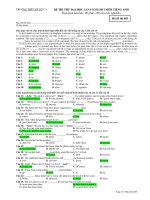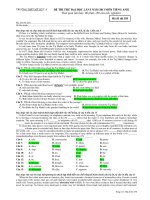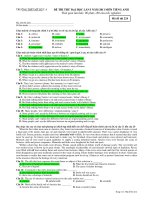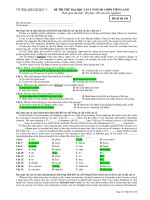- Trang chủ >>
- THPT Quốc Gia >>
- Ngoại Ngữ
ĐỀ THI THỬ ĐẠI HỌC LẦN II NĂM 2011 Môn TIẾNG ANH Khối D
Bạn đang xem bản rút gọn của tài liệu. Xem và tải ngay bản đầy đủ của tài liệu tại đây (144.06 KB, 8 trang )
ĐỀ THI THỬ ĐẠI HỌC LẦN II NĂM 2011 Môn TIẾNG ANH Khối D
Thời gian làm bài: 90 phút, không kể thời gian phát đề
(Đề thi có 06 trang)
Họ, tên thí sinh:
Số báo danh:
ĐỀ THI GỒM 80 CÂU (TỪ QUESTION 1 ĐẾN QUESTION 80).
Mark the letter A, B, C, or D on your answer sheet to indicate the correct answer to
each of the following questions.
Question 1: We _____ for three hours and are very tired.
A. are walking B. have been walking C. were walking D. had been
walking
Question 2: Thanks to the laser beams, at last, he could get rid of the __________birthmark on
his face.
A. normal B. abnormal C. abnormality D. abnormally
Question 3: _______________________ from Bill, all the students said they would go.
A. Except B. Only C. Apart D. Separate
Question 4: Not until a monkey is several years old ___________to exhibit signs of
independence from its mother.
A. beginning B. does it begin C. and begin D. it begins
Question 5: These days almost everybody ___________the danger of smoking.
A. know of B. are aware of C. is aware about D. is aware of
Question 6: Had the drought not lowered the reservoir the ancient
village_______________________
A. wouldn't be discovered B. wouldn't have been discovered
C. can't have been discovered D. can't be discovered
Question 7: It was not good to walk outside in ___________.
A. such a fearful cold B. such fear coldness C. such fearful cold D. so fearful a cold
Question 8: Mary: “ Do you think it will rain ? “ Jenny: “Oh ! ________”
A. I don’t hope. B. I hope not. C. I don’t hope so D. It’s
hopeless
Question 9: It is believed _____________ causes insomnia.
A. too much caffeine which B. that too much caffeine
C. it in too much caffeine D. too much caffeine that
Question 10: The train accident _____________ the other train’s departure by a few hours.
A. sent back B. called off C. delayed D. retained
Question 11: Not only________ much bigger than any other planets, but unlike the planets, it
consists completely of gaseous material.
A. Sun is B. the Sun, which is C. is the Sun D. that the Sun
Question 12: - “ More coffee?, Anybody?”
- “ ______________________________.”
A. I don’t agree, I’m afraid B. Yes, I’d love to C. Yes, please D. It’s right, I
think
Mã đề 145
Question 13: . ____________ to the national park before, Sue was amazed to see the geyser.
A. Being not B. Not having been C. Have not been D. Having not been
Question 14: She has to pass all her exams or _____________she would have no holiday.
A. instead B. else C. therefore D. though
Question 15: In America, when a woman and a man are introduced, shaking hands is up to a woman.
A. depends on B. replies on C. waits on D. congratulates on
Question 16: A few diseases are still___________in the world.
A. treatable B. untreatable C. treated D. untreated
Question 17: That beautiful girl died of an___________morphine.
A. overweight B. overhear C. overdo D. overdose
Question 18: He __________________________me to believe that they had left the district.
A. made B. led C. assured D. confirmed
Question 19: He was completely_________________________by her tale of hardship.
A. taken away B. taken down C. taken in D. taken up
Question 20: Uncle Ho’s desire was that our country might______other countries in the world.
A. be fed up with B. make use of C. keep pace with D. take grand
for
Question 21: Sarah is a young girl with________ and a straight nose.
A. almond-shaped eyes B. almond-eyed shape C. eyes shaped almond D. almond-
shape eyed
Question 22: You shouldn't ___________ to your teacher like that. It was very rude.
A. have talked B. talk C. have be talked D. talked
Question 23: Don’t bother me while I___________.
A. am working B. was working C. will work D. will have
completed
Question 24: Oh, no! My wallet has been __________________________________
A. robbed B. picked C. stolen D. theft
Question 25: There's someone at the door ___________________________________it.
A. I'm answering B. I answer C. I'll answer D. I answered
Question 26: Bill Gates is probably the best known and most successful_______in computer
software.
A. pioneer B. navigator C. generator D. volunteer
Question 27: - “ Can I use your motorbike this evening?”
- “ ______________________________________”
A. Of course, you can B. Of course, you might C. It’s my pleasure D. Do it if you
can
Question 28: His father left New York. The doctor suggested he________there.
A. not stayed B. won’t saty C. not stay D. not go to
stay
Question 29: No one died in the accident,________?
A. didn’t they B. did he C. didn’t he D. did they
Question 30: ___________the laser beam is very thin, it is intense enough to drill through the
most delicate bones.
A. When B. While C. Since D. Although
Read the following passage and mark the letter A, B, C, or D on your answer sheet to
indicate the correct answer to each of the questions from 31 to 40.
The White House, the official home of the United States president, was not built in time
for George Washington to live in it. It was begun in 1792 and was ready for its first inhabitants.
President and Mrs.John Adams, who moved in on November 1, 1800. When the Adamses moved
in, the White House was not yet complete, and the Adamses suffered many inconveniences; for
example, the main staircase was incomplete, which hindered movement from floor to floor, and
the future laundry yard was merely a pool of mud, so wet laundry was hung in the unfinished
East Room to dry. Thomas Jefferson, the third president, improved the comfort of the White
House in many respects and added new architectural features such as the terraces on the east and
west ends.
When the British forces burned the White House on August 24, 1814, President Madison
was forced to leave. All the remained after the fire was the exterior walls, the interior was
completely destroyed.It was not until December of 1817 that the following president, James
Monroe, was able to move into a rebuilt residence. Since then, the White House has continued to
be modified but has been continuously occupied by each succeeding U.S president.
Question 31: : Which of the following would be the most appropriate title for this text?
A. George Washington’s life in the White House.
B. The Early History of the White House.
C. The burning of the White House.
D. Presidential Policies of Early U.S.Presidents.
Question 32: Why did George Washington not love in the White House?
A. It had been burned by the British.
B. He did not like the architectural features.
C. He did not want to suffer the inconveniences that the Adamses had suffered.
D. Construction had not yet been completed.
Question 33: The word “ inhabitant” in line 2 is closest meaning to:
A. modifications B. moves C. celebrations D. residents
Question 34: It can be inferred from the passage that John Adams was:
A. the first president of the United States. B. the second president of the United
States.
C. the third president of the United States. D. the fourth president of the United
States.
Question 35: What of the White House was not yet complete when the Adamses moved in?
A. main staircase B. laundry yard C. pool D. A and B
Question 36: The author most likely discusses the “ staircase” in line 5 in order to:
A. show the elegance of the new White House
B. explain the architectural features added by Jefferson.
C. provide an example of an inconvenience in the White House.
D. demonstrate what had to be rebuilt after the fire.
Question 37: The word “ forces” in line 9 could best be replaced by:
A. military B.effort C. power D. energy
Question 38: According to the passage, which of the following best describes Thomas
Jefferson’s tenure in the White House?
A. He worked to improve the appearance and convenience of the White House.
B. He had to flee the White House because of the war with the British.
C. He removed the terraces that had been added by Adams.
D. He was accepting of the many inconveniences.
Question 39:According to the passage, when James monroe came to the White House, it had
been:
A. repressed B. reconstructed C. relocated D. reserved
Question 40: The paragraph following the passage most likely discusses:
A. the details of the destruction of the White House by the British.
B. James Monroe’s policies as presidents.
C. modifications by presidents who followed.
D. other presidents who were unable to occupy the White House.
Mark the letter A, B, C, or D on your answer sheet to indicate the word that differs from the
rest in the position of the main stress in each of the following questions.
Question 41: A. invaluable B. investigate C. intimacy D. intensity
Question 42: A. mathematics B. history C. literature D. physics
Question 43: A. weightless B. popular C. beautiful D. tomorrow
Question 44: A. forefather B. reassure C. surgery D. vaporize
Question 45: A. undergrowth B. untreatable C. solidify D.
conventional
Mark the letter A, B, C, or D on your answer sheet to show the underlined part that
needs correction.
Question 46: A paragraph is a portion of a text consists of one or more sentences related to the
same idea.
A B C D
Question 47: Chemical engineering is based on the principles of physics, chemists, and
mathematics.
A B C D
Question 48: I hadn’t understood his directions. However, I asked him to repeat what he’d said.
A B C D
Question 49: Although there were a lot of opposition initially, many people now accept that
infertile
A B C
couples have the right to medical help.
D
Question 50: With the development of the Internet and the World Wide Web, businessmen do
A B
not hardly have as much traveling as they used to.
C D
Read the following passage and mark the letter A, B, C, or D on your answer sheet to
indicate the correct answer to each of the questions from 51 to 60.
ENVIRONMENTAL ACTIVISTS
Paul Watson is an environmental activist. He is a man who believes that he must do
something, not just talk about doing something. Paul believes in protecting endangered animals,
and he protects them in controversial ways. Some people think that Watson is a hero and admire
him very much. Other people think that he is a criminal.
On July 16
th
, 1979, Paul Watson and his crew were on his ship, which is called the Sea
Shepherd. Watson and the people who work on the Sea Shepherd were hunting on the Atlantic
Ocean near Portugal. However, they had a strange prey; instead of hunting for animals, their prey
was a ship, the Sierra. The Sea Shepherd found the Sierra, ran into it and sank it. As a result, the
Sierra never returned to the sea. The Sea Shepherd, on the other hand, returned to its home in
Canada. Paul Watson and his workers thought that they had been successful.
The Sierra had been a whaling ship, which had operated illegally. The captain and the
crew of the Sierra did not obey any of the international laws that restrict whaling. Instead, they
killed as many whales as they could, quickly cut off the meat, and froze it. Later, they sold the
whale meat in countries where it is eaten.
Paul Watson tried to persuade the international whaling commission to stop the Sierra.
However, the commission did very little, and Paul became impatient. He decided to stop the
Sierra and other whaling ships in any way that he could. He offered to pay $25,000 to anyone
who sank any illegal whaling ship, and he sank the Sierra. He acted because he believes that the
whales must be protected. Still, he acted without the approval of the government; therefore, his
actions were controversial.
Paul Watson is not the only environmental activist. Other men and women are also
fighting to protect the Earth. Like Watson, they do not always have the approval of their
governments, and like Watson, they have become impatient. Yet, because of their concern for the
environment, they will act to protect it.
Question 51: According to the reading, an environmental activist is someone who ____
A. runs into whaling ship B. does something to protect the
Earth
C. talks about protecting endangered species D. is a hero, like Paul Watson
Question 52: When something is controversial , ____
A. everyone agrees with it B. everyone disagrees with it
C. people have different ideas about it D. people protect it
Question 53: The members of a ship’s crew are ____.
A. the men and women who work on the ship B. the people who work on the
airplanes
C. all of the people on a ship, including the passengers D. the people who own the ship
Question 54: The main idea of paragraph one is that ____
A. Paul Watson is a hero to some people B. activists are people who do
something
C. Paul Watson is a controversial environmental activist D. Paul Watson does not believe in
talking
Question 55: The Sea Shepherd was hunting ____
A. the Atlantic Ocean B. whales C. the Sierra D.
Portugal
Question 56: The author implies that Paul Watson lives in ____
A. Portugal B. a ship on the Atlantic C. the Sierra D.
Canada
Question 57: The captain and the crew of the Sierra were acting illegally because ____.
A. they were not obeying international laws B. they were whaling
C. they were killing and selling whales D. All of the above are correct
Question 58: In paragraph 3 the phrase “and froze it” refers to ____ .
A. whale meat B. the Sierra C. whales D. the Sierra
crew
Question 59: The main idea of paragraph 3 is that ____ .
A. the Sierra sold whale meat in some countries
B. the people on the Sierra didn’t obey international laws.
C. the people on the Sierra killed as many whales as they could.
D. whaling is illegal according to international law.
Question 60: Watson ran into the Sierra because ____ .
A. he wanted to stop the ship’s crew from whaling
B. he was impatient with the government’s actions
C. he wanted to protect the whales from the whalers
D. All of the above are correct
Mark the letter A, B, C, or D on your answer sheet to indicate the sentence that is
closest in meaning to each of the following questions.
Question 61: Although he was very tired, he agreed to help me with my homework.
A. Tired as he was, he agreed to help me with my homework.
B. Despite being very tired, but he agreed to help me with my homework.
C. Tired though he was, but he agreed to help me with my homework.
D. As tired as was he, he agreed to help me with my homework.
Question 62: I’m sure it wasn’t Mr. Phong you saw because he’s in Hanoi.
A. It couldn’t be Mr. Phong you saw because he’s in Hanoi.
B. You mustn’t have seen Mr. Phong because he’s in Hanoi
C. It can’t have been Mr. Phong you saw because he’s in Hanoi.
D. Mr. Phong mightn’t see you because he’s in Hanoi.
Question 63: I’m like my mum, whereas my brother looks like my dad.
A. I’m like my mum, whereas my brother takes after my dad.
B. I’m like my mum, whereas my brother takes over my dad.
C. I’m like my mum, whereas my brother takes on my dad.
D. I’m like my mum, whereas my brother takes in my dad.
Question 64: She had only just begun to speak when people started interrupting.
A. She hardly had begun to speak when people started interrupting.
B. Hardly she had begun to speak when people started interrupting.
C. Hardly had she begun to speak when people started interrupting.
D. She hadn’t begun to speak when people started interrupting.
Question 65: They would have never accepted his money if they had known his plan.
A. They knew what he wanted to do, so they refused his money.
B. They agreed with his wishes because they were glad to have his money.
C. They took the money he offered them without realizing his purposes.
D. They didn’t know his plan and never took the money from him.
Question 66: “ Let’s go to the cinema tonight” he suggested
A. He suggested them to go to the cinema that night
B. He suggested their going to the cinema that night
C. He suggested they went to the cinema that night
D. He suggested that let’s them to go to the cinema that night
Question 67: “You should have finished the report by now,” the boss said to his secretary.
A. The boss suggested his secretary should have finished the report on time.
B. The boss scolded his secretary for not finishing the report on time.
C. The boss reminded his secretary of finishing the report on time.
D. The boss advised his secretary to finish the report on time.
Question 68: I was on the point of leaving the house when he came.
A. No sooner had I left the house than he came.
B. I had hardly left the house when he came.
C.When he came I had just left the house.
D. I was just about to leave the house when he came.
Question 69: "Why don't you get your hair cut, Gavin?" said Adam.
A. Adam advised Gavin to cut his hair.
B. Gavin was suggested to have a haircut.
C. It was suggestable that Adam get Gavin's haircut.
D. Adam suggested that Gavin should have his haircut.
Question 70: Without skilful surgery he would not have survived the operation.
A. Had it been for skilful surgery he would not have survived the operation.
B. He wouldn't have survived the operation if he hadn't had skilful surgery.
C. But for skilful surgery he would not have survived the operation.
D. With skilful surgery he would have survived the operation.
Read the following passage and mark the letter A, B, C, or D on your answer sheet to
indicate the correct word for each of the blanks from 71 to 80.
Face-to-face conversation is two-way process: You speak to me, I reply to you and so on.
Two-way (71)______depends on having a coding system that is understood by both (72)______
and receiver, and an agreed convention about (73)______ the beginning and end of the (74)
______. In speech, the coding system is the language like English or Spanish; the convention that
one person speaks at a time may seem too obvious to (75)______. In fact, the (76)______ that
people use in conversations and meetings are often non-verbal. For example, lowering the pitch of
the voice may mean the end of a sentence; a sharp intake of breath may signal the desire to
(77)______, catching the chairman’s (78)______may indicate the desire to speak in a formal
setting like a (79)______, a clenched fist may indicate anger. When these (80)______ signals are
not possible, more formal signals may be needed.
Question 71: A. interchange B. exchange C. correspondence D. communication
Question 72: A. announcer B. transmitter C. messenger D. sender
Question 73: A. signing B. symbolizing C. signalling D. showing
Question 74: A. message B. topic C. idea D. theme
Question 75: A. judge B. mention C. recognize D. notice
Question 76: A. signals B. symptoms C. symbols D. signs
Question 77: A. interchange B. interfere C. interrupt D. intercept
Question 78: A. elbow B. eye C. shoulder D. hand
Question 79: A. chat B. debate C. broadcast D. lecture
Question 80: A. visual B. auditory C. verbal D. sensory
THE
END
KEY
1B 11C 21A 32B 41C 51B 61A 71D
2B 12C 22A 32C 42A 52C 62C 72D
3C 13B 23A 33D 43D 53A 63A 73C
4B 14B 24C 34B 44B 54C 64C 74A
5D 15A 25C 35D 45A 55C 65C 75B
6B 16B 26A 36C 46B 56D 66B 76A
7C 17D 27A 37A 47C 57D 67B 77C
8B 18B 28C 38A 48B 58A 68B 78B
9B 19C 29D 39B 49A 59B 69D 79B
10C 20C 30D 40C 50C 60D 70C 80A









